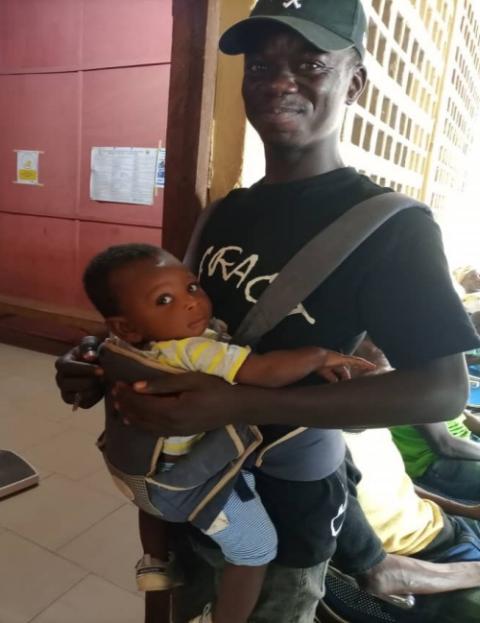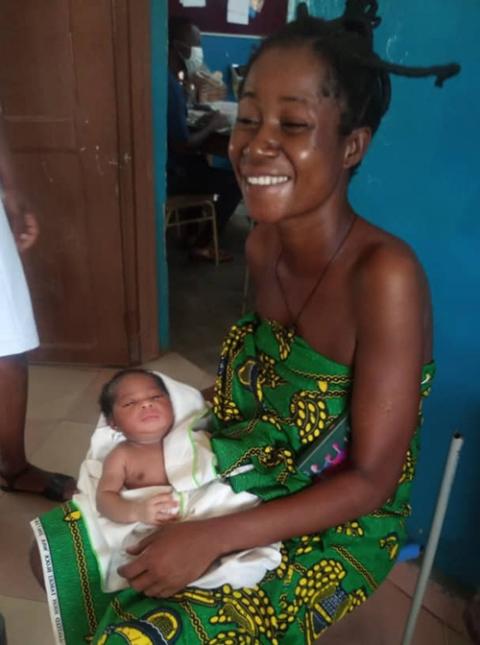
Mary Immaculate Sr. Stephany Ayomah, left, and Daughter of Mary Mother of Mercy Sr. Agatha Chiamaka, a midwife at Good Shepherd Health Centre at Tuna in the Damongo Diocese, demonstrate how to use flipcharts during one of a June trainings in Tamale, Ghana. (Courtesy of Francis Monnie)
Zakaria Jabaru is one of the happiest parents to be seen carrying his newly delivered twin babies for vaccination at Our Lady of Rocio Catholic Clinic in Walewale, Ghana, Nov. 15.
Jabaru's gesture is thanks to the intervention of Integrated Mother and Babies Course (IMBC), an initiative by the Conference of Major Superiors of Religious - Ghana that trains sisters and health care volunteers to address the welfare of infants and toddlers, as well as promote maternal mental health.

Zakaria Jabaru, a father of twins, chose to send his children for postnatal services and care at Our Lady of Rocio Catholic Clinic at Walewale, Ghana. (Courtesy of SCORE ECD Project)
"Formerly, I did not know that young men like me have a responsibility to help my partner after she labors, especially when she is in pain," Jabaru said. "But for the intervention of the IMBC, I now know. Thanks to sisters who are going round to educate us on our role as fathers."
The Integrated Mother and Babies Course is one of the early childhood development projects within the program "Strengthening the Capacity of Religious Women in Early Childhood Development" in a country where more than 50% of people in deprived areas live below the poverty line (less than US$1 a day), and as many as 30% live in extreme poverty.
The workshops for the sisters cover early childhood development, nutrition, emotionally supportive learning for children, identifying depressive behaviors, mood regulation, maternal mental health integration, and strengthening of couple relationship. (The Conrad N. Hilton Foundation, which also funds Global Sisters Report, and Catholic Relief Services Ghana support this project, with the religious conference supervising the effort.)
St. Louis Sr. Mercy Boateng, past president of the major superiors in Ghana, noted that the program will help community health volunteers, pregnant and lactating mothers and other early childhood caregivers understand the importance of responsive feeding, safety and security, positive parenting, play-based stimulation and early learning opportunities.
"I am now better placed to educate mothers on how to take care of their babies, improve on their hygiene, live and take good care of their families as regards their physical, social, spiritual and emotional development," said Mary Immaculate Sr. Stephany Ayomah, who participated in a July training session.
Advertisement
According to the World Health Organization, pregnant women and new mothers in developing countries are disproportionately affected by depression and other mental health disorders, which can adversely affect breastfeeding, mother-child bonding, parenting quality and the child's overall development.
The project, therefore, aims to address the situation where many children in the country fail to reach their full potential due to the illiteracy of parents. By offering mental health care as a part of reproductive care, the health care delivery system can help decrease stigma and increase accessibility for mothers.
Between 2016 and 2020, Ghana recorded more than 540,000 pregnancies amongst adolescent girls aged 15-19 years, and 13,444 pregnancies among those aged 10-14 years. According to the United Nations Population Fund, this demographic is prone to several sexual and reproductive health consequences, including sexually transmitted infections, gender-based violence, abuse and exploitation, fistula, and other post-partum reproductive challenges affecting their nutrition and psychological well-being.

New mother Mary Ayelkima said she otherwise would have broken down after delivery if not for the intervention of the Integrated Mother and Babies Course. (Courtesy of SCORE ECD Project)
Mary Ayelkima, a new mother, said her postpartum psychosis would've broken her down after her delivery, if not for the sisters' IMBC intervention, as they visited her at her father's house in Damongo.
"Their visit has improved my mood," she told GSR. "Irrespective of my predicament, I have accepted my situation and I am cheerful after delivery of my bouncing baby girl."
As the manager for Catholic Relief Services' SCORE ECD (Strengthening Capacity of Religious Women in Early Childhood Development) III projects, including the Integrated Mother and Babies Course, Mary Immaculate Sr. Juliana Lamisi Akayeti said the sisters' goal is to have children (from infancy to age 3) in their target regions live in nurturing environments by 2024, as well as provide nurturing care and family strengthening services to the children's caregivers.
The few who are literate in the communities, she said, are indispensable assets to the project, serving as "lead mothers who coordinate and educate the beneficiary groups."
As part of a holistic approach to early child development, the program adapted the curriculum to help low-literacy audiences. Community health volunteers and "lead mothers" (under the supervision of nurses or sister master-trainers) execute this program through group sessions and home visits, and nearly 150 mothers have been trained to lead the early childhood development sessions.
Akayeti also said the sisters expect Ghana's Conference of Major Superiors to strengthen the project's organizational capacity by 2024 as well, "to get every Ghanaian Catholic sister involved in this exercise for the welfare of all Ghanaians."

Sisters participate in a training workshop on Simple Measurement of Indicators for Learning and Evidence-Based Reporting in Tamale, Ghana, June 27-July 1. (Courtesy of Francis Monnie)
Eighteen IMBC groups have been formed in Damongo, Cheriponi and Saboba in northern Ghana, an area where half of the country's most deprived districts can be found.
Thanks to the program, "families have united and are working together helping each other to take care of their children," Akayeti said, and partners are able to recognize one another as teammates in their child's advancement. Their work also aims to correct the trend among babies in Africa, she said, where in their crucial first 1,000 days babies often experience poor health, inadequate nutrition and little early stimulation.
Between March and September, 200 early childhood development groups — with 3,600 members — have formed across the 10 project districts. And from July to September, 18 IMBC groups have formed, with six master-trainers and nine community health volunteers currently rolling out sessions on mood regulation to protect mothers and caregivers.
Participants are guided on how to measure moods using the IMBC flow chart, which aims to support mothers on how to identify depressive behaviors by regularly measuring their moods. The identification of depressive behaviors in the earliest stages helps mitigate the negative effect on mothers and caregivers, which has a drop-down effect on positive child nurturing.

Sister participants make toys at the SCORE ECD June training workshop in Tamale, Ghana. (Courtesy of Francis Monnie)
Akayeti said that, with the training, "fathers especially are now sending their children for postnatal services and clinical cares as Zakaria has done, hence [he has become] one of the first male champions of IMBC."
Adams Mahama, a workshop participant from Tinga in the Savannah Region, said society has defined restrictive roles for husbands and wives, and that "the training has exposed me to the fact that decision-making and roles — such as helping my wife in the kitchen or accompanying her to market — is a shared one and a mutual support aimed at strengthening relationships."
For her part, Latifa, Mahama's wife, said the training helped her realize how to respond in a more meaningful way.
"I used to express gratitude to my husband through actions but I've learned that doing so in words is very important," she said. "I'll now appreciate my husband with words."
Akayeti said the sisters' call for this mission is a "mystery" to them, one that the sisters cannot "adequately explain why we choose to live it."
"We are all naturally motivated and are therefore passionate about human development and progress particularly the nurturing care of the child."

Participants and Catholic Relief Services staff pose for a group photo at a SCORE ECD training on Simple Measurement of Indicators for Learning and Evidence-Based Reporting in Tamale, Ghana, June 27-July 1. (Courtesy of Francis Monnie)








